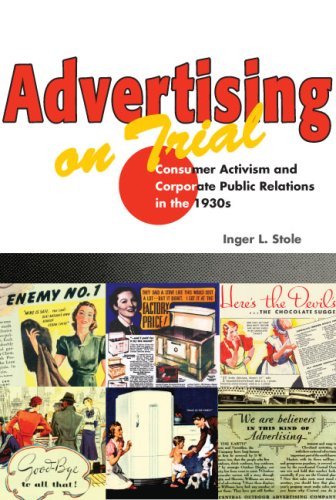Submitted by Mandy Gutmann on
 From the interviewer:
From the interviewer:
"Imagine trying to compare the amount of sugar in two boxes of cereal, without having the nutrition facts. The only information available is that of the advertiser guaranteeing there's less sugar than in similar brands. The advertiser could be lying, but no authority exists to judge. This was the dilemma that consumers found themselves in during the early 1900s. The demand for grade labeling and product information escalated into a constant battle between consumers and advertisers. In Advertising on Trial: Consumer Activism and Corporate Public Relations in the 1930s, author Inger Stole examines how the consumer movement fought to transform advertising. I had the opportunity to interview Stole about her recently published book and the business of advertising. The quotes attributed to her below are from our conversation."
Inger Stole initially became interested in the consumer movement while researching her Ph.D. dissertation. She began writing about how the media industry viewed women as the principal consumers and that television's daytime purpose was advertising to them. Wanting to learn more about advertising in the pre-television era, Stole found that there was a huge conflict over advertising during the late 1920s and 30s. The fight came during this period because advertising had inconspicuously been creeping in pre-World War I, but in post-war time it exploded. "People woke up and realized that so much of the information they were getting as consumers was based on the information that the manufacturers were giving them," Stole says. Because their knowledge was at the mercy of the advertisers, some consumers decided to take a stand and fight for more information. By researching the key players Stole was able to put the whole battle into context, something that no writer has ever done.
The struggle played out like a game of tug-of-war with consumer groups fighting for tighter legislation and advertisers trying to dissuade politicians from passing strict laws. Advertisers didn't want to provide this information fearing that if people could compare brand name ingredients with generic ingredients, they'd discover the products were almost identical. Information would ruin the magic surrounding the product. "Advertisers tell you that happiness or fulfillment or belonging can really be bought," explains Stole. The goal is to make a product appear capable of transforming lives and convince the buyer that only one specific product can create that desired effect. Advertisers claimed product labeling would ruin the essence of their business, which is why they fought long and hard to keep this from happening. It wasn't until the 1960s that the labeling law was put into effect.
Similar to the situation today, private interests and money interests really ran the game. Consumers were given significantly shorter time to speak during senate hearings since they were presided over by Senator Joel Bennett "Champ" Clark, who had strong ties to drug industries. People were unaware of the corrupt activities going on in the senate hearings because "...big advertisers were behind the scenes and they were saying to media owners 'Okay, if you guys talk too much or explain too much about this ongoing fight to regulate advertising, you can kiss your advertising dollars goodbye,'" says Stole. "Consequently, readers were ill informed about the legislative battle and the bill that finally passed provided very little in terms of consumer protection."
According to Advertising on Trial, the consumer has lost the majority of its battles. "There are some small victories, but all in all I think we're deeper in the hole than we were in the 1930s," says Stole. When asked about the way in which the consumer has succeeded, Stole brought up someone she mentions briefly in her epilogue. "Ralph Nader is sort of my hero as a consumer activist. He has done more for people in America than I think anyone else." Nader's efforts led to mandatory installment of safety belts in cars and he called for corporate responsibility and for regulatory government agencies to take their consumer protection mandates more seriously. The fight to protect the consumer has changed face over the decades. "Because we are part of this commercial culture, all the really obvious things that people in the 1930s realized...we don't see today because we're so enmeshed in it," says Stole. Children born in more recent decades can't imagine buildings without billboards or events without commercial sponsors. This is all just a way of life now. Whereas a century ago the consumer movement focused on child labor and food safety, it has transformed and currently deals with more global issues.
Though it may appear to be out of the control of the consumer, advertising in America still has the potential to be transformed. "We can pick up the pieces and fight against a world that is increasingly becoming dominated by commercialism. There might not be many years left that we can do this," says Stole. She believes that the best way to challenge advertising is by teaming up with a small watchdog group like The Center for Media and Democracy, Commercial Alert or Free Press and connecting advertising issues with these groups' fight. The hope is for a more fair and just society. Stole hopes people will read her book and find issues that they wish to investigate on their own. "And," she adds, "eventually we would all work on these issues and there would be a bigger body of knowledge and understanding of where we're going and what we can do."
Inger Stole is an Assistant Professor of Communications at the University of Illinois at Urban-Champaign's Institute of Communications Research, an internationally recognized program for interdisciplinary education, scholarship, and public service in communication and culture. She received her Ph.D. from the University of Wisconsin-Madison and currently serves as a member of the board of directors for the Center for Media and Democracy.
Mandy Gutmann interned with the Center for Media and Democracy during the summer of 2006. She is a senior studying journalism at Ithaca College.
